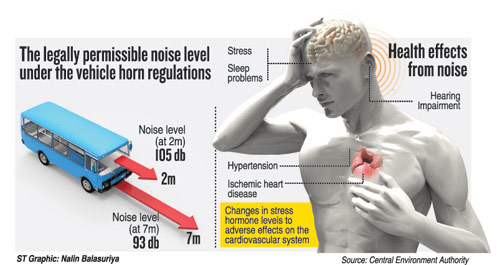News
Sound waves battering our health
Sound pollution is increasing and has become second nature to Sri Lankans, with most people unaware of the consequences of prolonged exposure to loud noise.
The law mandates that drivers cannot sound horns with sound levels exceeding 105 decibels within a 2m range or more than 93 decibels within a 7m range.
This law is ignored by more than 80 per cent of drivers of buses and lorries – the main culprits – research carried out in 2013 involving 216 vehicles in Malabe, Koswatte and Katubedde showed.
Bus drivers often replace the normal horns in their vehicles with air horns which produce ear-piercing sound though compressed air.
Central Environment Authority (CEA) Director-General K.H. Muthukudaarachchi said talks will be held with Registrar of Motor vehicles (RMV), the police and other authorities to obtain equipment for routine sound checks and plan a systematic approach to tackle this issue.
Environmentalists say government authorities are ill-prepared to deal with the problem.
“The authorities don’t have systems to check noise pollution. They don’t constantly monitor noise pollution,” Sri Lanka Green Movement Programme Manager Banduranga Kariyawasam said.
“People tolerate or ignore noise pollution because they are not aware of its consequences and don’t know whom they should complain to,” he said.
Mr. Muthukudaarachchi said the CEA has warned bus owners and drivers to remove air horns or face legal action. The CEA has begun checking vehicles to see if they do not comply with the law.
“Almost 300 drivers have been held by the Environment Police Unit of the CEA and 370 vehicles have undergone tests during a noise pollution control programme carried out recently in Pettah, Galle, Kandy, Ratnapura, Ratmalana and Anuradhapura,” Mr. Muthukudaarachchi said.
The driving licences of 310 drivers have been seized and they have been given a deadline to remove the extra horns in order to retrieve their licences.

Mr. Kariyawasam urged the holding of talks and lectures in schools to highlight the menace of noise pollution and the role of the children in preventing it.
Consultant Ear, Nose and Throat surgeon at the Colombo National Hospital, Dr. Chandra Jayasuriya said the health effects related to traffic noise were widespread, ranging from irritability, sleep disturbances and changes in stress hormone levels to adverse effects on the cardiovascular system.
“People’s bodies respond to noise even during sleep,” he said. “Being exposed to sound can cause breathing problems increase blood pressure, cause mental distress, disturbed sleep, heart-related diseases and hearing impairment.”
The effects are more severe on pregnant woman, he said.
The CEA’s Deputy Director of Air Quality, R.M. Kulasena, said a major problem was that noise pollution standards are unspecified and not part of regulations, thus weakening the implementation of the laws.
“Because of the absence of regulations and the lack of standards to measure noise pollution the police ordinance is not strictly enforced,” he said. “Observance of the law has gradually broken down and now it is ignored altogether at times.”Noise emission standards need to be set for the vehicles, he said.
Legal remedies for notice pollution exist but action has to be initiated by a member of the public or the authorities concerned, Environmental Production Division (EPD), Director ASP D.W.W. Rajapaksa said.
Honking horns in restricted zones such as near hospitals, schools and traffic lights – or in traffic jams – is restricted.
“Government needs to have new regulations in different areas, and zones need to be identified as industrial, commercial, residential or silence areas and anyone exceeding the specified noise level should be face legal action,” ASP D.W.W. Rajapaksa said.Complaints about loud noise can be made to the EPD on 011 258 7124 and 011 3040 562 or by email to dir.environment@gmail.com

